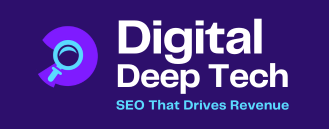How Search Engines Work: Crawling, Indexing and Ranking
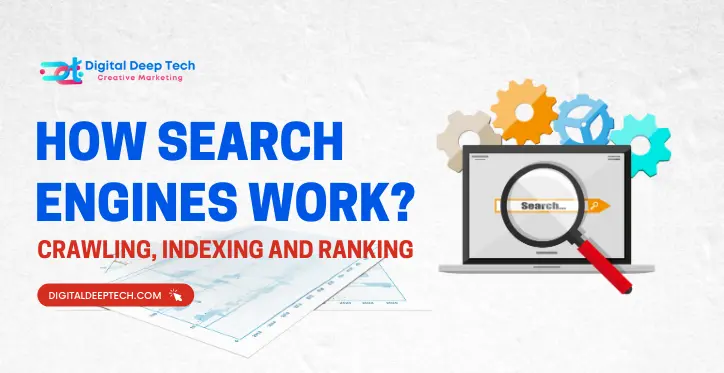
Table of the content
Introduction
At some point in your life, you have surely thought about how Google can fetch the perfect result for a query. The feeling is almost magical when seconds later information needed pops up. Of course, it’s not magic-it’s the mighty power of search engines working for you. After all, understanding how search engines operate can help master SEO.
Hi, I am Deepak Sharma, founder of Digital Deep Tech and a Local SEO expert. This is the Day 3 of 90 Days of FREE SEO Couse “How search engine works?”. For years, I have been assisting businesses in understanding and getting optimized for their sites by focusing on the way search engines crawl, index, and rank content. In this blog, I’ll break down those steps so that you know exactly how search engines work, thus making it easier to make improvements to your own site in terms of its visibility and performance.
If you ever wanted your website found, it first has to be crawled and indexed correctly. Then comes the real challenge: ranking on Google. Without such an understanding, building a beautiful store in the middle of nowhere won’t get you much. Now relax; you will soon learn how to bring your website to the forefront of the search results!
How Search Engines Work?
Many website owners have no concept how the search engines work. Common belief is that with a lot of content present at a website, one would rank high in Google. The truth is that the process is much more complex. If you do not know about crawl, index, and rank websites by search engines, then you are missing the most basic concept in SEO. Your website might be up and live, but without proper visibility, it won’t attract traffic, and all your effort in building that site may go to waste.
The chief issue is that most business owners and digital marketers do not know how significant these three phases—including crawling, indexing, and ranking—are when one is looking at success with search engines. If these stages are not carried out correctly, your contents may never have a chance at being seen at all.
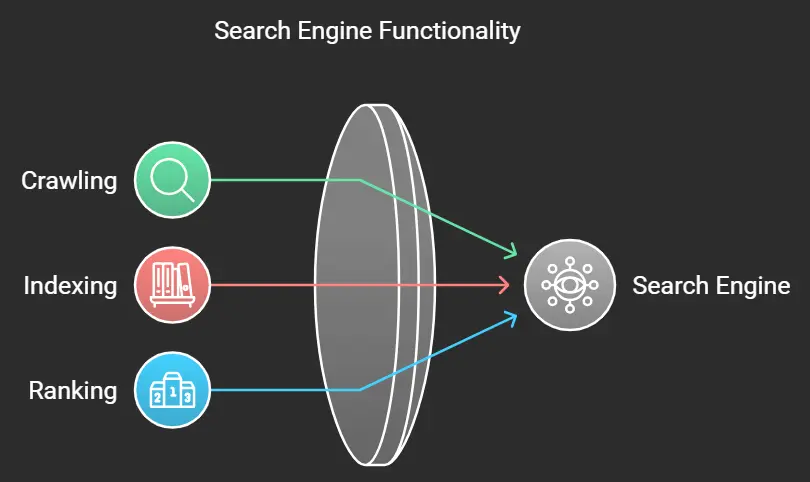
The Cost of Not Thinking About How Search Engines Work
Imagine this: you’ve been working for months trying to build your website. You have implemented fabulous content, optimized all your images, even launched a few social media campaigns, and still there are no hits from Google or other search engines. Why? The truth is that even if your website is now live, search engines may not even know it exists.
Without crawling, indexing, and ranking, all your hard work is for nothing. It’s like opening the most beautiful shop in the desert-if nobody knows it is there, it does not matter how great it looks. If search engines cannot find, understand, or rank your content, you are basically invisible online.
Crawling, Indexing, and Ranking - Learn More
So, what is the way out? Understanding how search engines work will be the key. Once you grasp how crawling, indexing, and ranking occur, you can take concrete actions that help you boost your visibility and rank better in the SERPs. Let’s go through each of the phases so you can see what it means and how you can optimize your website for each step.

1. What does crawling mean.
The first step in how search engines work is crawling. This is the process by which search engines send out bots, often called spiders or crawlers, to find new content on the web. The bots will follow links from one page to another, collecting data about each page they visit. It’s just like a search engine exploring the internet; we are just browsing all the various websites.
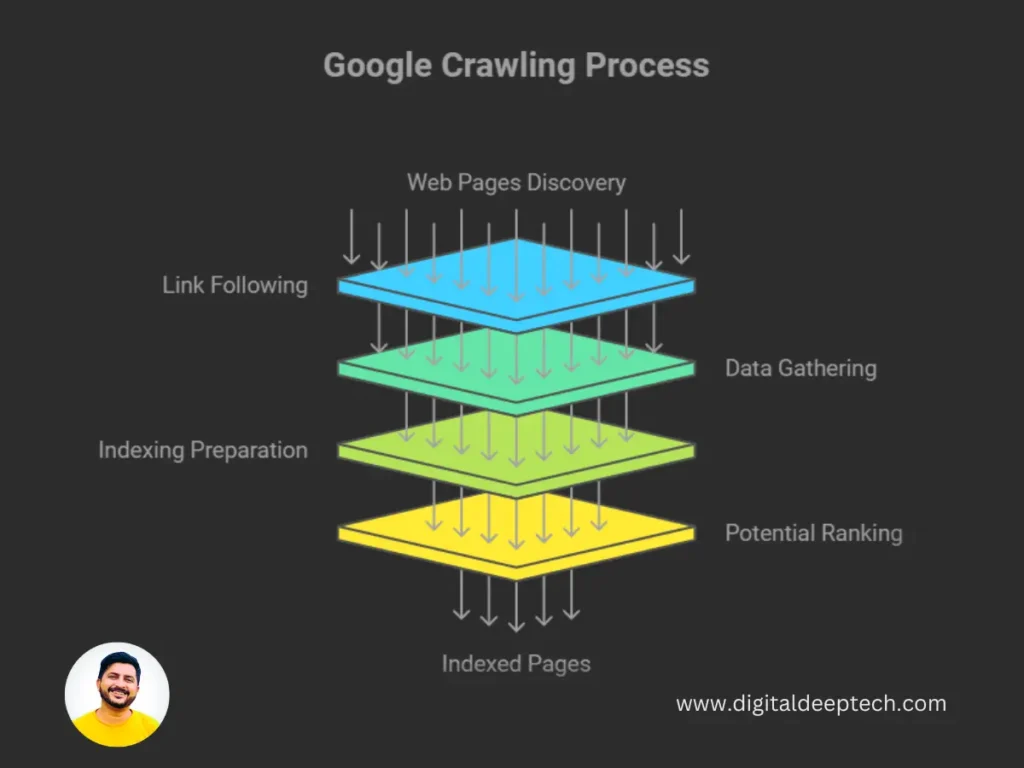
How Crawling Works:
- Crawlers follow links: When a search engine bot comes to one of your pages, it follows the links from that page to find other pages. That’s why having a plan for internal linking is so important. If there are no links to important pages, the search engines may never find them.
- They scan page content: That is the content a bot reads, be it text, images, videos, or other elements on your pages. It will crosscheck how relevant your contents, keywords, and metadata are.
- How frequently they crawl: Bots do not crawl a website every day. It’s usual for them to crawl frequently updated good-quality sites more often than sites which include outdated or irrelevant content.
Why crawling is important:
The second problem is if the search engines cannot crawl your website; they cannot find your content. This is really problematic for new websites or pages that do not have many links pointing to them. Without crawling, the page simply won’t appear in search results, no matter how good the content is.
Enhancing Crawling:
- Create and submit a sitemap: A sitemap is essentially a file that lists all the important pages on your website. Submitting this to Google Search Console ensures that Google’s bots can find and crawl your content .
- Internal linking: Link to your important pages from other parts of your website to help crawlers find them.
- Refresh your website regularly: New content will keep the search engines informed that your website is alive and kicking, and it will cause the bots to crawl it more often.
- Do not have broken links: If a bot hits a link and finds that it is broken, it might stop crawling certain areas of your website, and most probably all of your pages will not be crawled.
Determine which data you want to store and how you will classify data
Let's Discuss Your Project
Get a free one-week consultation and share your vision for digital marketing with us.
2. How Indexing Works
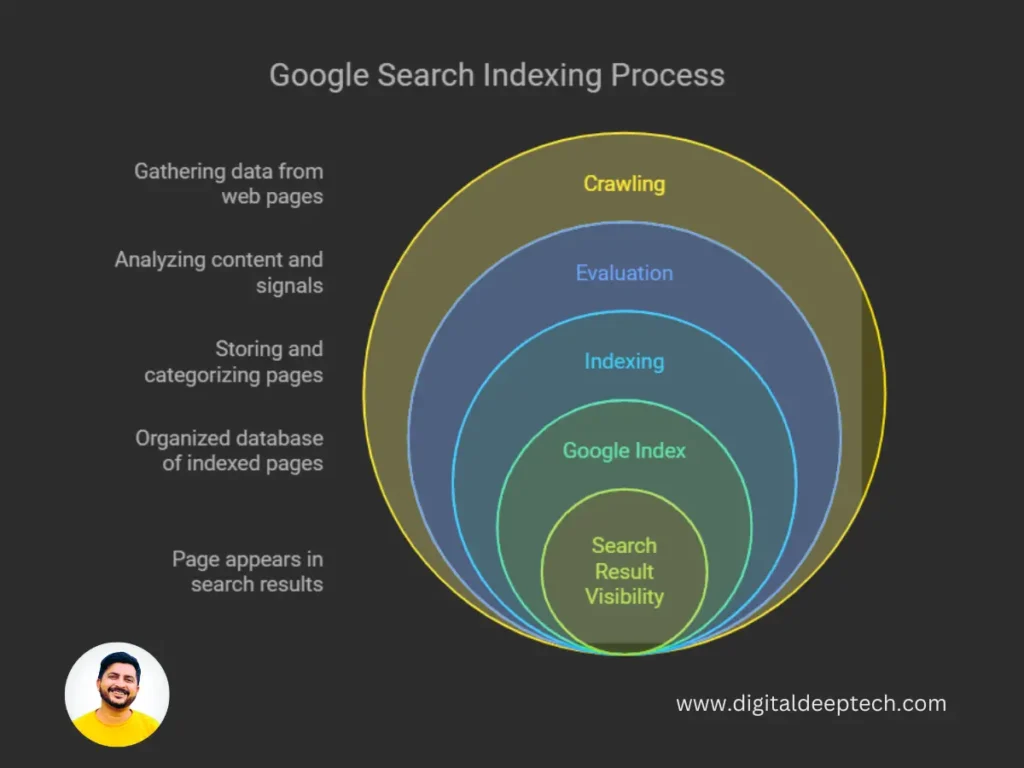
Now, after crawling comes indexing. This is how search engines store and categorize the information they have crawled. Once the site has been crawled, it gets indexed so that search engines can eventually serve it up in search results when relevant queries are made.
- To cache content: After the crawling process, the search engines scan the contents of your page and store it in a humongous database. The database is referred to as an index. The index contains all information regarding your website – keywords, metadata, and page structure.
- Categorization of content: During the indexing phase, the search engines determine what content is and what the content is talking about categorize the content accordingly. This means that the search engines need to interpret or understand what the text, pictures, or for that matter, what your video content has to say.
- These are duplicate content issues : When you have many pages that are considered to have greatly identical or duplicate content, a search engine may not want to index all of them. This is a common case in e-commerce sites, where they have product descriptions that are almost the same on several pages.
Why Indexing?
The bottom line is that your content can’t be found if it’s not indexed. The index is what Google, and indeed most search engines, use to pull up relevant pages from the surface. For instance, you may write a blog on “local SEO tips,” but that page won’t appear in search when someone searches for that term unless it’s been indexed.
Optimizing Indexing
- Ensure that it is original: Do not repeat the same thing on different pages. Google likes seeing unique, good quality content.
- Use structured data: Schema markup and other forms of structured data help Google read your content better. This can increase your indexing, potentially bringing richer snippets.
- Submitt pages: If you have added a new page, or updated existing content, submit those pages to Google Search Console.
- Optimize your metadata: Meta titles and descriptions should clearly describe the content of your page and contain relevant keywords.
3. Ranking: The Battle for the Top Spot
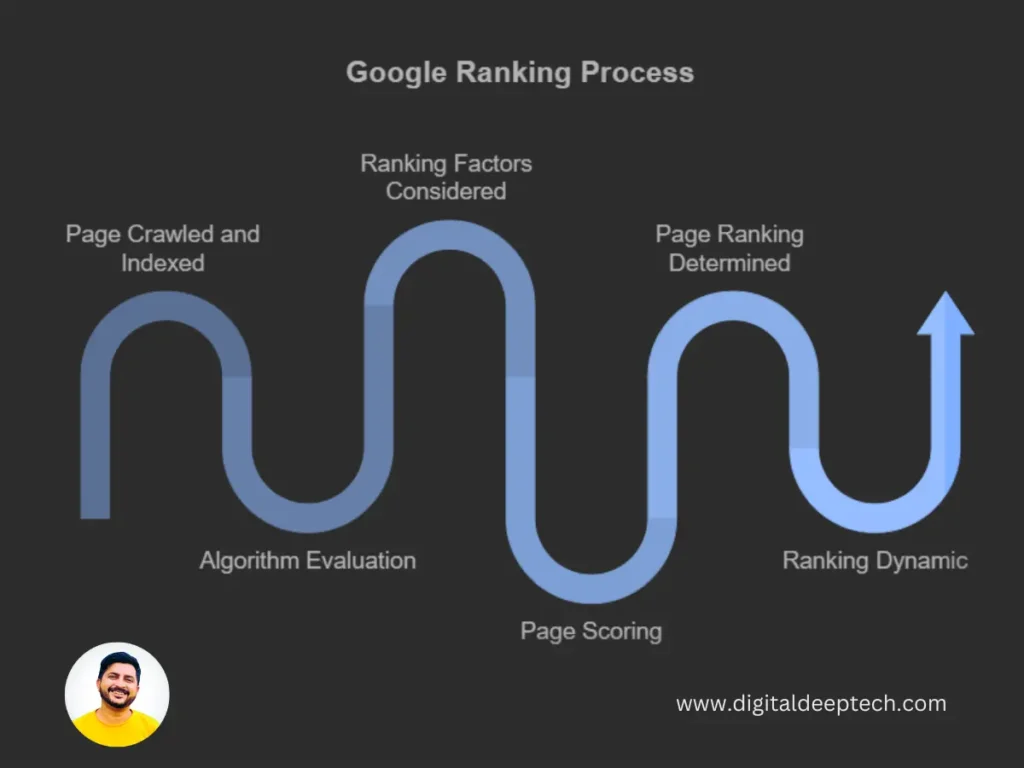
Ranking is the final step, which in itself is of course the most important. Only after your website has been crawled and indexed, does a search engine determine how closely your content relates to a specific search query. Hundreds of factors are used by these search engines to rank your pages on the results page.
How Ranking Works
- Relevance: Whenever someone is searching for a keyword, the search engines will strive to show them the best relevant content concerning that query. Relevance depends on keywords used on your page, topic, and how it can adequately answer their question.
- Content quality: Quality dictates ranking. If your content is old, lacks depth, or is useless, then forget about ranking even if indexed.
- User experience: While favoring websites with an excellent UX, Google takes into account mobile-friendliness, page speed, and ease of navigation as relative factors.
- Authority: The highest ranking factor is “authority” which historically has been measured through backlinks. A backlink is simply when someone else’s website links to your site. Thus, the more high-quality backlinks you have; the greater that authority will be in the eyes of search engines.
Why Ranking Matters:
It doesn’t guarantee that your site will rank high though. Ranking reveals where a website ranks in the results. Ideally, you want to be on the first page since studies indicate that most people never dig any deeper than the first few results.
Why Ranking Matters:
Link building is one of the main parts of any SEO strategy. I will help build quality backlinks from meaningful and relevant websites around your niche, thus improving credibility in the eyes of Google.
How to improve ranking:
- Keyword optimization: Use the keywords in your title tags and meta descriptions, headings and throughout your body of content. However, do not keyword stuff. Instead use it naturally.
- High-quality content: Be sure to give value to a reader by ensuring that your content is full of information and engaging. Therefore, the more informative and engaging content you will give them, the more probable it will rank.
- Backlinks: Having reputable websites build backlinks to your site increases the domain authority. This then has a positive effect on ranking.
- Improve site speed: A slow site is a blow for rankings. Make use of tools like Google PageSpeed Insights to have the speed of your site checked out and optimized.
- Mobile optimization: Google’s mobile-first indexing ranks and indexes using the mobile version of your site. Ensure your site is responsive and looks beautiful on mobile.
4. Practical Applications: How to Boost Your SEO
Having learned how search engines function-crawling, indexing, and ranking-you now have an understanding of the basics of SEO. So, what are some practical ways to improve your SEO? Here are some specific actionable steps:
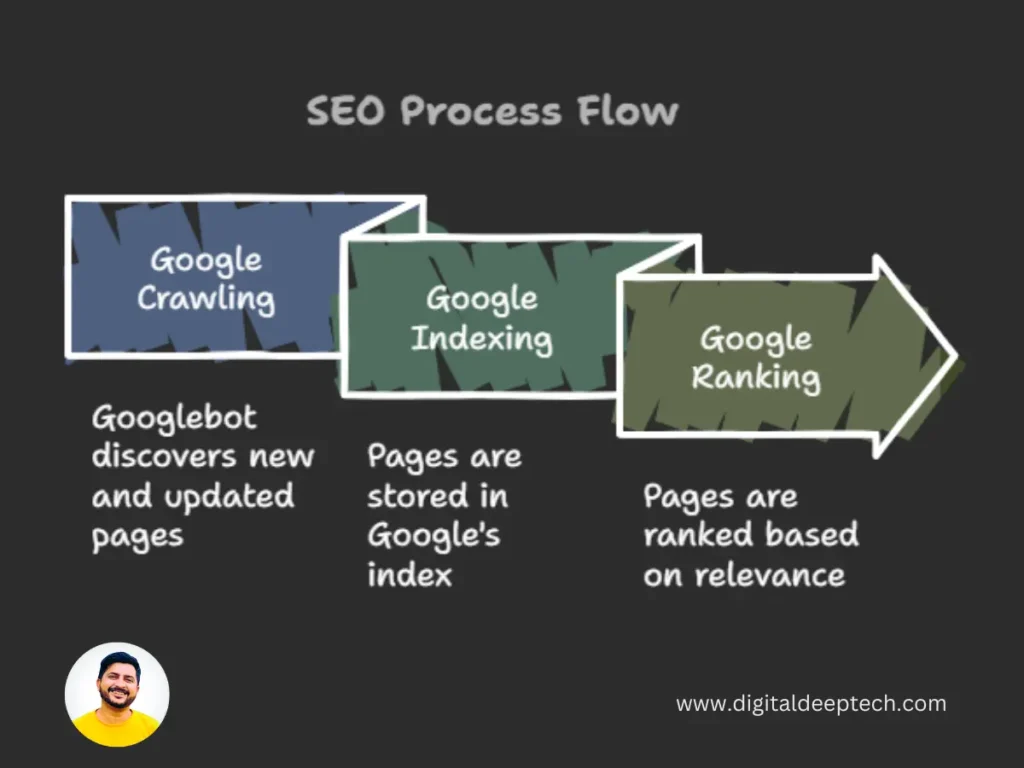
Keyword Research:
First, find the right keywords. Google Keyword Planner, Ahrefs, or SEMrush will assist you in finding keywords that relate to your business. Long-tail keywords would be ideal, because they are phrases that people use when searching and have less competition.
On-page SEO refers to the optimization of every page of your website. For one to rank higher, there are improvements that need to be made to their titles, including meta descriptions, headers, and keywords.
Optimize Technical SEO
Technical SEO ensures all aspects on your site are optimized for crawling and indexing. Some of the things you need to do include improving your site speed, ensuring that it is mobile friendly, and that your site is secure with HTTPS.
Generate Great Content
In short, content is the king to SEO. Blogs, guides, and videos need to be published regularly, adding value to your audience. The more relevant and interesting your content is, the more probable it’s going to rank.
Link Building
Build links from trusted sources, which gets Google to accept that the content of your website is worth trust. So, in order to do so, reach out to some industry publications; collaborate with influencers, or just create shareable content that brings backlinks.
Monitor and Adjust
SEO is not a one-time thing. It is something you do ongoing through tools such as Google Analytics and Google Search Console that allows you to track your rankings. Modify your approach based on the data to make those rankings better over time.
Conclusion
By now, you must know how web search engines work-from crawling, to indexing, and finally ranking-and why these work streams are important for having successful SEO. Mastering these steps will make a big difference in the visibility of your website, more traffic, and eventually growing your business.
This is the Day 3 of 90 Days of FREE SEO Couse “How search engine works?” Note that SEO is a marathon and not a sprint. That means you optimize your site regularly, create valuable content, and keep moving with changes in the search engines. If you really feel you can’t manage it all, then don’t wait to take help from the experts. I am Deepak Sharma, founder of Digital Deep Tech. I would love to assist you optimize the site for improved performance. Just shoot a mail and get free SEO consultation today!
Frequently Asked Questions (FAQs)
1. What is crawling in SEO?
Crawling in SEO refers to the process where a search engine bot, also called spiders, travels the internet and discovers new or updated content on websites by following links for data gathering from web pages, which is then stored within the database of the search engines for indexing.
2. How do I make sure my site gets crawled by search engines?
Make sure your site gets crawled through the following:
- Submit an XML sitemap to Google Search Console.
- Design an effective internal link structure .
- Don’t block key pages by using them in your robots.txt file
- Keep your content fresh and active, it will signal your activity to the search engines.
3. What is Indexing?
The search engine goes through the gathering information, to organize and store it. It is categorizing the content so that when users search for terms that are included in their database, those contents can be retrieved for display in results.
4. Is my website indexed by Google?
Use the “site:” command in Google to see if your site is indexed. You do this by using the “site:yourdomain.com” command. It then displays all the pages of your site that Google has indexed. You can further use the Google Search Console through Google to check on the indexing status and request indexing of new pages.
5. Why is my website not being indexed?
- Your pages are blocked by a “noindex” tag or a robots.txt file.
- Some crawl errors can keep bots from accessing your site.
- Your content may be too similar to other pages (duplicate content).
- Your website could be too new, with the search engines not having crawled them.
What determines a ranking by a search engine?
Thousands of factors with search engines rank websites, including:
- Quality of content and relevance
- Target keywords usage
- Mobile-friendliness
- Speed of loading page.
- User experience, such as navigation and website structure or layout.
- Domain authority and quality backlinks.
7. How Do I make my website rank better on Google?
Improve your ranking with the following:
- High-quality, relevant and valuable content.
- Optimize your on-page SEO elements, as such as title tags, meta descriptions, headers, Schema markup and more.
- Earn quality links from websites with good authority.
- Improve your site’s speed and mobile performance.
- Use proper keyword research and target long-tail keywords.
8. How often should I update my website content for better rankings?
No specific frequency is set, but the content should be updated periodically to make the website appear as if active, thus letting the search engines have knowledge of this. You must update content as necessary to maintain accuracy, relevance, and depth and to include creating new blog posts or pages as part of an ongoing content strategy.
9. What is the difference between crawling and indexing?
Crawling is the discovery process wherein the web pages are discovered by search engines from following links and collecting data. Then comes the index, wherein the collected data is examined, classified, and stored in the database of the search engine for retrieval and display on results pages.
10. My website is indexed, but it ranks so low.
If website indexed but ranking low then it may be following the reasons:
- Low-quality content or not relevant to search queries.
- Few or of low quality backlinks.
- Bad user experience, such as slow loading time, or not too simple for navigation.
- Wrong keywords and not effective usage.
- Your competitor’s websites better optimized and more authority in the niche.

About the Author
Deepak Sharma is the founder of Digital Deep Tech and a renowned SEO and digital marketing expert with over a decade of experience. Passionate about helping businesses enhance their online presence, Deepak specializes in creating SEO strategies that drive traffic and generate leads.

